Master's program at the Technical University of Munich
Hello!
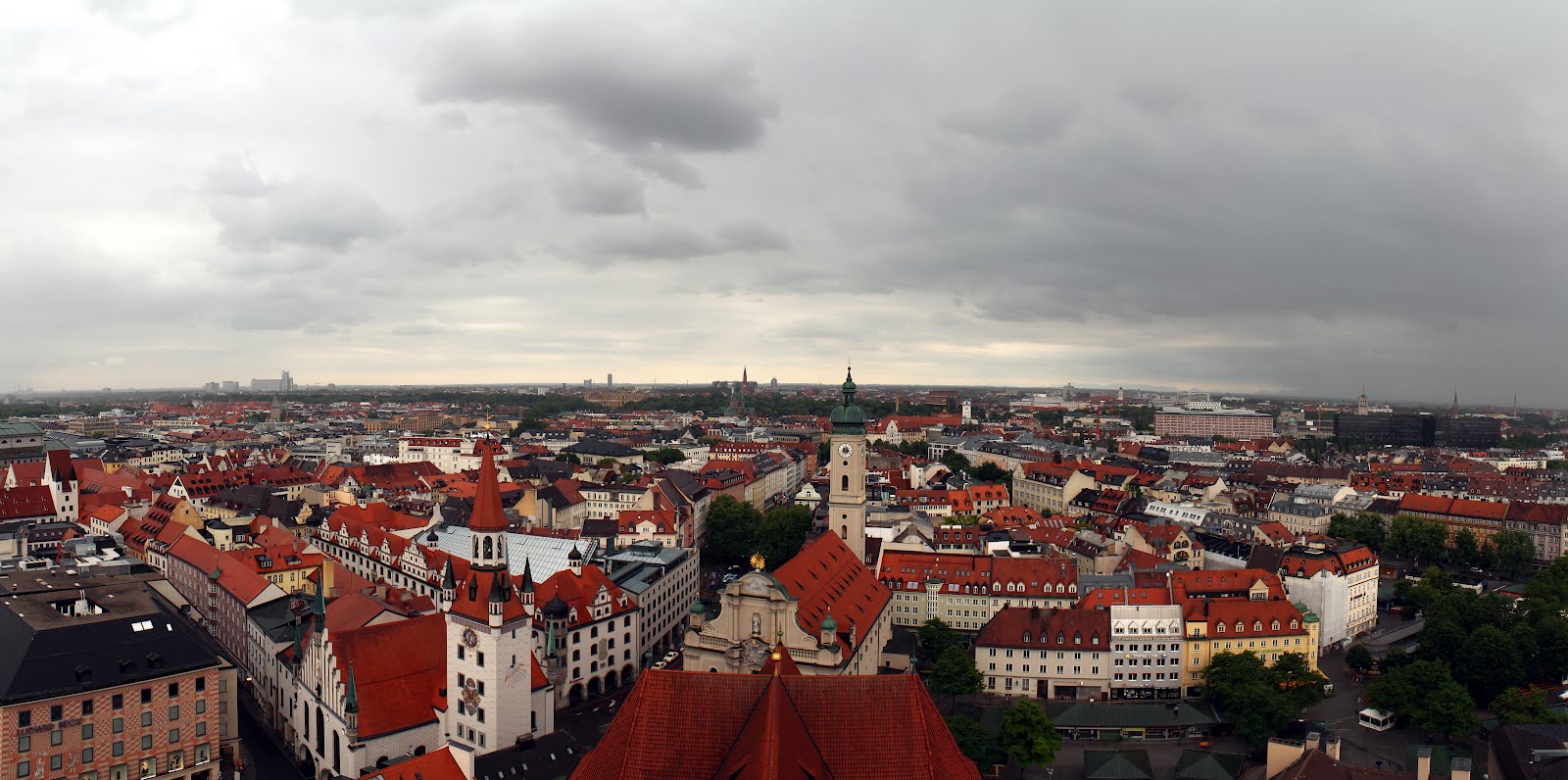
Many readers of the Habré are young talented guys who graduate from a university or are in one of the senior courses of technical universities in Russia and the CIS. Surely, many have questions, "what to do next," "where to go to work," and so on. Two and a half years ago, I was in the same position and decided that I was still youngand handsome and would have time to plunge headlong into work later. In the meantime, you can look at other countries, learn and gain experience.
I want to share my impressions, because two years ago I dreamed that a person would appear and explain to me how admission, enrollment, study, exams, payment, passing an exam in a foreign language, which university is better and why and so on. But there was no such person, I had to make my way everywhere with hundreds of e-mails with questions.
So, first things first:
Despite the fact that at the university in Russia I studied physics, after some choice, I entered the Technical University of Munich (TUM) at the Faculty of Informatics. I knew how to program, I knew computers, besides I found an interesting specialty that combines physics modeling, numerical methods and high-performance calculations on supercomputers.
For starters, I have identified several universities where you could study. I looked in Google at the request of “top 10 German technical universities”. In the end, I decided to try to enter RTWH University in Aachen or TUM in Munich. In Aachen, training was closer to pure Computer Science; I applied only to Munich.
To study in a magistracy, a Russian bachelor's degree (or master) is sufficient.
Since my situation with German was not very good, I found the English-language program Computational Science and Engineering. Similar programs exist in other universities, you just need to search and choose which is more suitable.
1) We hand over TOEFL ibt. You can register for the exam on the TOELF website . Testing centers are in all major cities. It costs about 6K rubles. The results are given in 2 weeks, the letter arrives in 6 weeks.
2) If we enter the winter semester, then documents to the university must be submitted, as a rule, before spring. We must take this into account and not be late.
3) If you are already studying for a master's degree in Russia while TOEFL is being mailed, you need to go to your university and ask for an academic certificate. This is such a fashionable reference on paper with watermarks, where all current grades and tests are painted.
4) As a rule, the whole set of documents looks something like this:
- TOEFL ibt certificate
- completed application (must be downloaded from the university website)
- one or two letters of recommendation from the supervisor
- motivation letter (covering letter, personal statement)
- resume (CV)
- A copy of the diploma
- A copy of the school certificate
All documents must be translated into German / English and certified by a notary. As a rule, this is done very quickly and not very expensive.
You should be very careful about writing a motivation letter. There is no need to tell a biography or mention what can be read in the resume. This document must show what kind of motivated person you are, why you should study at this university, what are the prerequisites for this, and highlight the previous scientific work. It is necessary to keep within one page.
CV is very convenient to do semi-automatically on the Europass website .
After the entire set of documents has been collected, we send it to the selection committee of the university. As soon as the letter arrives, the university will report it. The term of consideration is different everywhere, I think it will take 1-2 months (or a month after the deadline).
If everything is ok, then you will be informed about the successful receipt. Additional telephone interviews may be required.
If you have received confirmation of admission to one of the universities in Germany, the next step will be to obtain a visa. You must contact the consulate in your area.
When applying for a national visa, the following documents are needed:
1. An application for a national visa (can be found on the embassy's website) with photos
attached 2. An application in accordance with paragraph 55 of the Stay Act (usually attached to the main application)
3. An invitation from the university
4. Confirmation of financial security.
Keep track of current requirements.
About the fourth point in more detail. In case you received a scholarship (for example, DAAD), then you need to provide documents on the scholarship. Otherwise, you need to open a blocked account (Sperrkonto) in a German bank (for example, Deutschebank) and provide an extract from there. I could not open such an account, so I took an extract from a Russian bank, from my account in euros, translated it into German and assured a notary public. In addition, I wrote an obligation with a notary public to open a blocked account immediately upon arrival in Germany.
The following documents may be useful (but not mandatory):
5. Motivation letter.
6. Certificate of passing the exam in German (or English, because I study in English)
7. Copies of diplomas certified and translated into German.
After about 4-6 weeks, they will call from the embassy and report the result. Such a long review period is due to the fact that the documents are sent to Germany.
Munich is the capital of Bavaria. As it turned out later, most of the things associated with Germany actually came from Bavaria: beer with sausages, national costumes, BMW and Audi, Siemens, Oktoberfest, alpine meadows and so on.
The city is an industrial center with hundreds of companies working in the field of mechanical engineering, medical technology, information technology, finance and insurance. The largest two universities LMU and TUM have about 80 thousand students. The population of the city is about 1.4 million people, mild climate with not very cold winters and moderate summers. Alps rise on the horizon, the city has many parks and cozy squares.
Prices are noticeably higher than in the rest of Germany and the surrounding small cities. Of course, salaries are also higher, but salaries still need to be unlearned at the university. Those who persistently seek can find both scholarships and good, affordable housing. Transport is also quite expensive, especially after Russia. But from the next semester they will introduce a special ticket for students - about 230 euros for six months for any type of transport (including electric trains). In general, the transport system is just excellent, you can quickly and easily get anywhere. I got sick of having a machiu. From March to November you can ride a bicycle (everywhere there are bicycle paths).
In general, 300 euros for housing, 50 for transport, 80 honey. insurance, ~ 200 per meal. You can work, there are many IT companies, students are willingly taken.
TUM has three large campuses (the third I have never seen, but they say that the brewing department is located there). The first is located in the very center of the city and occupies a whole block. The second, where I study, is located outside of Munich, near the suburb of Garching. Called Garching Forschungszentrum - Garching Research Center. There is a metro line to the campus.
Campus on the map Google-maps
On the campus there are the following faculties: Physical, Chemical, Computer Science and Mathematics, Mechanical Engineering. Also, on the other side there is a large Institute of Plasma Physics named after Max Planck (no one studies there, only conduct scientific research)
Faculty of Mechanical Engineering, right:
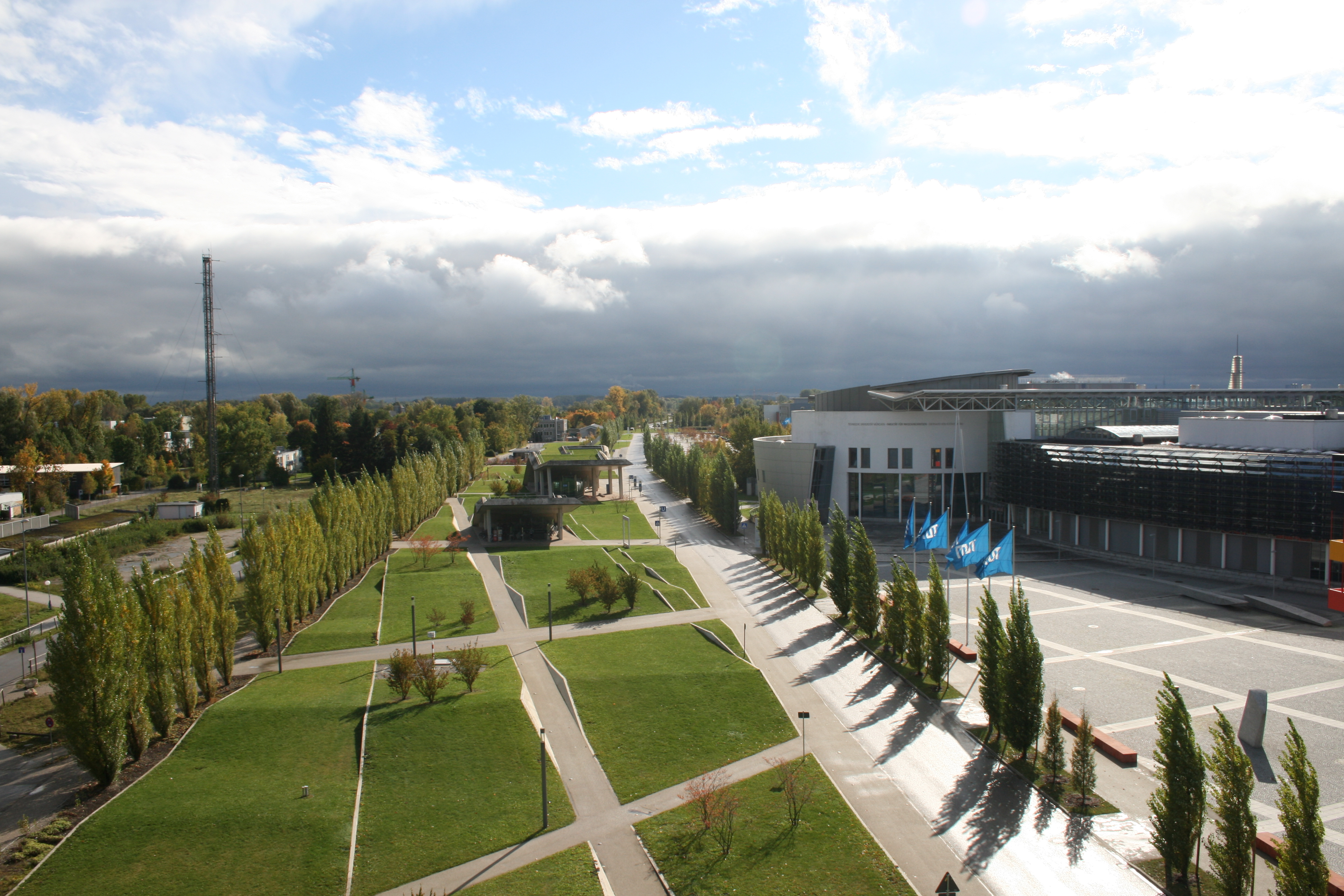
Since the campus was built in the early 2000s, all buildings are very new and meet all modern standards. The design is rather austere, and sometimes the building looks like a factory :)
A few photos from the phone:
Faculty of mechanical engineering inside:

Large audience: A

university is equipped (compared to my old one in Russia) is simply unbelievable. A projector is hanging in each room (in large 2), boards go up and down at the touch of a button, teachers give lectures with a microphone connected to the audience's audio system.
Once or twice a year, the faculty holds an open day, where everyone can come. Among the visitors there are many uncles and aunts with children, who with curiosity examine all the stands and ask hundreds of questions. A corner has been organized for children, where from different sticks and stripes they can collect a variety of geometric shapes, fractals, etc. Also, many prospective students.

By the way, the pipes that you see in the background are real slides on which you can ride from the fourth to the first floor sitting on the rugs.
Students and teachers prepare various stands to demonstrate the result of their work.
Distributed scientific imaging system with motion capture.

Real-time simulation - tsunami in the Pacific, off the coast of Japan. Calculations and visualization are done on a GPU using CUDA:
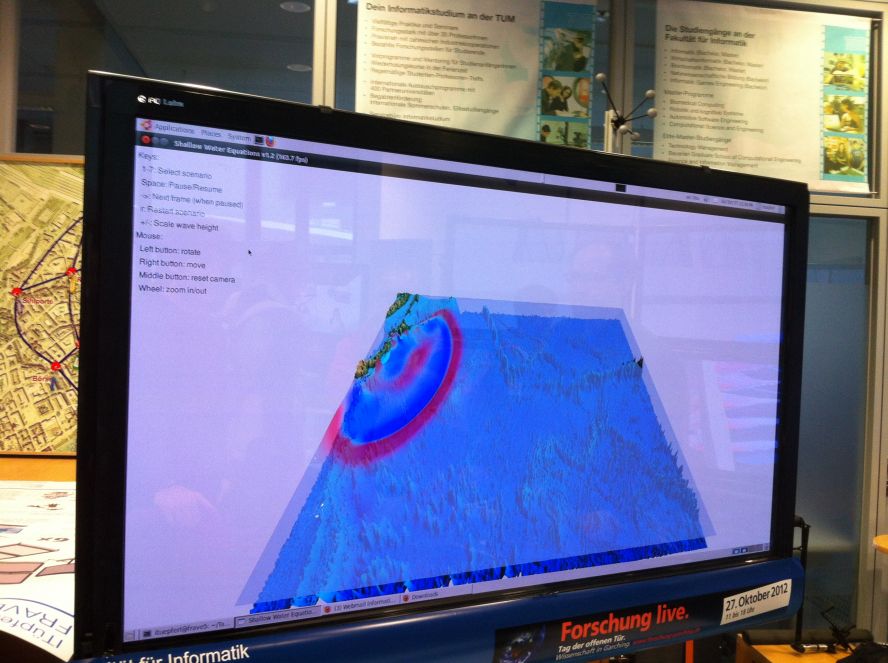
A girl controls a robot arm using sensors mounted on her arm:
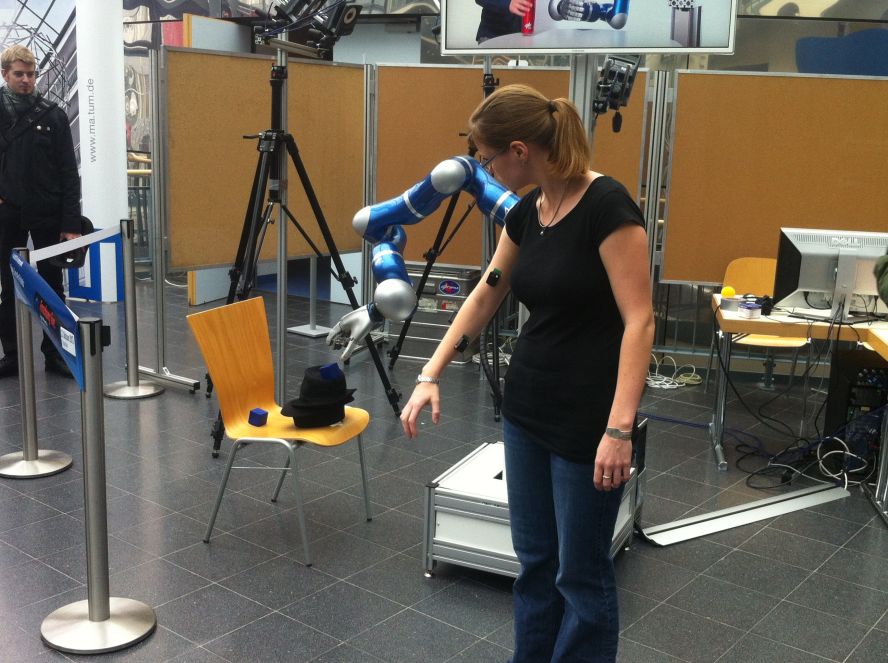
Our project in computational fluid dynamics is a real-time simulation of a waterfall. We solved numerically the Navier-Stokes equation with the boundary condition of the free surface and obstacles.
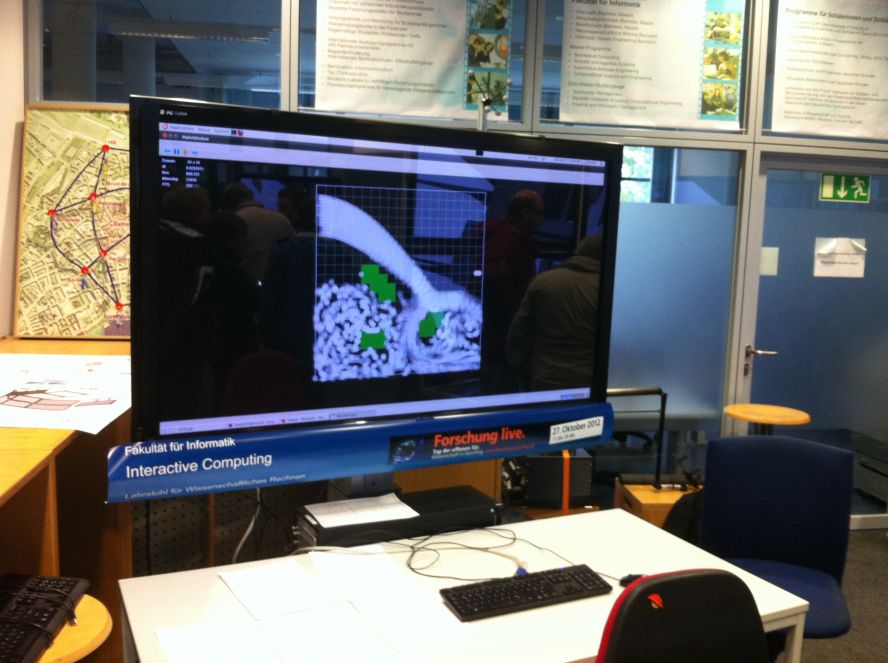
Visitor children play by collecting geometric shapes and fractals from hangers:

I don’t remember all the departments at our faculty, but I can list a few.
Department of Scientific Computing (Scientific computing Chair). He is engaged in computational hydrodynamics, creating effective frameworks for solving PDE on parallel systems, modeling tsunamis and earthquakes, partially plasma physics.
Department of parallel systems. He is engaged in increasing the efficiency of systems with MPI and OpenMP, developing systems for analyzing performance.
Department of applied software. Probably the simplest, but no less interesting - effective methods of software development, many projects on the iOS and MacOS platforms.
Department of Scientific Visualization (TUM 3D). Ray tracing systems and efficient rendering, image processing. Actively collaborates with various enterprises in Munich.
You can read more on the website of the Faculty of Informatics .
Studying is somewhat different from what we are used to in Russia. There are winter (mid-October - February) and summer (mid-April - July) semesters. Vacations are quite long. In addition, there is a two-week vacation for the New Year and Christmas.
Some departments establish for their students the necessary minimum of subjects that must be passed. In general, the choice of items is completely arbitrary. There is an information system for the entire university, where each student can find subjects of interest to him and register for attending lectures (by the way, no one controls the visit).
Each item has a certain number of credits, in other words, the value of the item. Each loan approximately corresponds to 30 hours of work (in lectures or at home for homework). In the semester, you need to collect about 30 credits in various subjects. Light review lectures usually cost 2-4 credits, large complex courses of laboratory work 8-10.
For example, in the past semester, I studied the required subjects: programming supercomputers (5), parallel numerical methods (numerical linear algebra on parallel systems, 4 credits), patterns in software (5) and scientific visualization (4). Elective subjects: particle modeling (3), image processing in physics (5) ,.
Basically, all exams are written. The list of questions is never published in advance; there is no “ticket” system. You just learn everything that was included in the lecture. Particular emphasis is placed on practice and solving examples from homework.
In the research center there are two huge buildings LRZ (Leibniz Computer Center), inside which there is a supercomputer (until recently it was 4th in the top500 list) - SuperMUC. In addition to the main computer, there are several training clusters on which small calculations are performed, and students do homework and laboratory work.
SuperMUC on Wikipedia (English)
As far as I know, undergraduate education is free. The cost of studying for a master's program is 500 euros per semester, but will soon be canceled (it has already been canceled throughout Germany, only Bavaria remains).
Almost all master's courses are taught in English. Therefore, I never had problems with German. All students speak English easily, at first you can live and study without knowing anything in German at all. Of course, in everyday life you need German: go to the store, hairdresser. but it’s easy to learn.
In Germany there are many interesting and prestigious technical universities: TUM, RWTH, FAU (Erlangen and Nuremberg), KIT (Technical University of Karlsruhe). Each offers an extensive selection of programs (you should actively study their Internet pages).
Tuition is small, even compared to Russia, especially compared to England and the United States. It is very interesting to live and study in the center of Europe, you can easily go to any neighboring country.
You constantly meet a lot of smart, interesting and talented people, students from all over the world study at the university. A lot from China, Russia, Latin America.
Admission is simple, the maximum that awaits you is a telephone interview. The decision on admission is made on the basis of a Russian diploma, resume, letters of recommendation and other pieces of paper telling how well done you are.
It is impossible to describe everything in one go, I guess I missed something. I can answer your questions.
At the university, beer is sold at the buffet.

Many readers of the Habré are young talented guys who graduate from a university or are in one of the senior courses of technical universities in Russia and the CIS. Surely, many have questions, "what to do next," "where to go to work," and so on. Two and a half years ago, I was in the same position and decided that I was still young
I want to share my impressions, because two years ago I dreamed that a person would appear and explain to me how admission, enrollment, study, exams, payment, passing an exam in a foreign language, which university is better and why and so on. But there was no such person, I had to make my way everywhere with hundreds of e-mails with questions.
So, first things first:
Motivation
Despite the fact that at the university in Russia I studied physics, after some choice, I entered the Technical University of Munich (TUM) at the Faculty of Informatics. I knew how to program, I knew computers, besides I found an interesting specialty that combines physics modeling, numerical methods and high-performance calculations on supercomputers.
For starters, I have identified several universities where you could study. I looked in Google at the request of “top 10 German technical universities”. In the end, I decided to try to enter RTWH University in Aachen or TUM in Munich. In Aachen, training was closer to pure Computer Science; I applied only to Munich.
Admission process
To study in a magistracy, a Russian bachelor's degree (or master) is sufficient.
Since my situation with German was not very good, I found the English-language program Computational Science and Engineering. Similar programs exist in other universities, you just need to search and choose which is more suitable.
1) We hand over TOEFL ibt. You can register for the exam on the TOELF website . Testing centers are in all major cities. It costs about 6K rubles. The results are given in 2 weeks, the letter arrives in 6 weeks.
2) If we enter the winter semester, then documents to the university must be submitted, as a rule, before spring. We must take this into account and not be late.
3) If you are already studying for a master's degree in Russia while TOEFL is being mailed, you need to go to your university and ask for an academic certificate. This is such a fashionable reference on paper with watermarks, where all current grades and tests are painted.
4) As a rule, the whole set of documents looks something like this:
- TOEFL ibt certificate
- completed application (must be downloaded from the university website)
- one or two letters of recommendation from the supervisor
- motivation letter (covering letter, personal statement)
- resume (CV)
- A copy of the diploma
- A copy of the school certificate
All documents must be translated into German / English and certified by a notary. As a rule, this is done very quickly and not very expensive.
You should be very careful about writing a motivation letter. There is no need to tell a biography or mention what can be read in the resume. This document must show what kind of motivated person you are, why you should study at this university, what are the prerequisites for this, and highlight the previous scientific work. It is necessary to keep within one page.
CV is very convenient to do semi-automatically on the Europass website .
After the entire set of documents has been collected, we send it to the selection committee of the university. As soon as the letter arrives, the university will report it. The term of consideration is different everywhere, I think it will take 1-2 months (or a month after the deadline).
If everything is ok, then you will be informed about the successful receipt. Additional telephone interviews may be required.
Getting a visa
If you have received confirmation of admission to one of the universities in Germany, the next step will be to obtain a visa. You must contact the consulate in your area.
When applying for a national visa, the following documents are needed:
1. An application for a national visa (can be found on the embassy's website) with photos
attached 2. An application in accordance with paragraph 55 of the Stay Act (usually attached to the main application)
3. An invitation from the university
4. Confirmation of financial security.
Keep track of current requirements.
About the fourth point in more detail. In case you received a scholarship (for example, DAAD), then you need to provide documents on the scholarship. Otherwise, you need to open a blocked account (Sperrkonto) in a German bank (for example, Deutschebank) and provide an extract from there. I could not open such an account, so I took an extract from a Russian bank, from my account in euros, translated it into German and assured a notary public. In addition, I wrote an obligation with a notary public to open a blocked account immediately upon arrival in Germany.
The following documents may be useful (but not mandatory):
5. Motivation letter.
6. Certificate of passing the exam in German (or English, because I study in English)
7. Copies of diplomas certified and translated into German.
After about 4-6 weeks, they will call from the embassy and report the result. Such a long review period is due to the fact that the documents are sent to Germany.
Town
Munich is the capital of Bavaria. As it turned out later, most of the things associated with Germany actually came from Bavaria: beer with sausages, national costumes, BMW and Audi, Siemens, Oktoberfest, alpine meadows and so on.
The city is an industrial center with hundreds of companies working in the field of mechanical engineering, medical technology, information technology, finance and insurance. The largest two universities LMU and TUM have about 80 thousand students. The population of the city is about 1.4 million people, mild climate with not very cold winters and moderate summers. Alps rise on the horizon, the city has many parks and cozy squares.
Prices are noticeably higher than in the rest of Germany and the surrounding small cities. Of course, salaries are also higher, but salaries still need to be unlearned at the university. Those who persistently seek can find both scholarships and good, affordable housing. Transport is also quite expensive, especially after Russia. But from the next semester they will introduce a special ticket for students - about 230 euros for six months for any type of transport (including electric trains). In general, the transport system is just excellent, you can quickly and easily get anywhere. I got sick of having a machiu. From March to November you can ride a bicycle (everywhere there are bicycle paths).
Cost of living and money
In general, 300 euros for housing, 50 for transport, 80 honey. insurance, ~ 200 per meal. You can work, there are many IT companies, students are willingly taken.
Campus
TUM has three large campuses (the third I have never seen, but they say that the brewing department is located there). The first is located in the very center of the city and occupies a whole block. The second, where I study, is located outside of Munich, near the suburb of Garching. Called Garching Forschungszentrum - Garching Research Center. There is a metro line to the campus.
Campus on the map Google-maps
On the campus there are the following faculties: Physical, Chemical, Computer Science and Mathematics, Mechanical Engineering. Also, on the other side there is a large Institute of Plasma Physics named after Max Planck (no one studies there, only conduct scientific research)
Faculty of Mechanical Engineering, right:

Since the campus was built in the early 2000s, all buildings are very new and meet all modern standards. The design is rather austere, and sometimes the building looks like a factory :)
A few photos from the phone:
Faculty of mechanical engineering inside:

Large audience: A

university is equipped (compared to my old one in Russia) is simply unbelievable. A projector is hanging in each room (in large 2), boards go up and down at the touch of a button, teachers give lectures with a microphone connected to the audience's audio system.
Research work of teachers and students
Once or twice a year, the faculty holds an open day, where everyone can come. Among the visitors there are many uncles and aunts with children, who with curiosity examine all the stands and ask hundreds of questions. A corner has been organized for children, where from different sticks and stripes they can collect a variety of geometric shapes, fractals, etc. Also, many prospective students.

By the way, the pipes that you see in the background are real slides on which you can ride from the fourth to the first floor sitting on the rugs.
Students and teachers prepare various stands to demonstrate the result of their work.
Distributed scientific imaging system with motion capture.

Real-time simulation - tsunami in the Pacific, off the coast of Japan. Calculations and visualization are done on a GPU using CUDA:

A girl controls a robot arm using sensors mounted on her arm:

Our project in computational fluid dynamics is a real-time simulation of a waterfall. We solved numerically the Navier-Stokes equation with the boundary condition of the free surface and obstacles.

Visitor children play by collecting geometric shapes and fractals from hangers:

Chairs
I don’t remember all the departments at our faculty, but I can list a few.
Department of Scientific Computing (Scientific computing Chair). He is engaged in computational hydrodynamics, creating effective frameworks for solving PDE on parallel systems, modeling tsunamis and earthquakes, partially plasma physics.
Department of parallel systems. He is engaged in increasing the efficiency of systems with MPI and OpenMP, developing systems for analyzing performance.
Department of applied software. Probably the simplest, but no less interesting - effective methods of software development, many projects on the iOS and MacOS platforms.
Department of Scientific Visualization (TUM 3D). Ray tracing systems and efficient rendering, image processing. Actively collaborates with various enterprises in Munich.
You can read more on the website of the Faculty of Informatics .
Studying proccess
Studying is somewhat different from what we are used to in Russia. There are winter (mid-October - February) and summer (mid-April - July) semesters. Vacations are quite long. In addition, there is a two-week vacation for the New Year and Christmas.
Some departments establish for their students the necessary minimum of subjects that must be passed. In general, the choice of items is completely arbitrary. There is an information system for the entire university, where each student can find subjects of interest to him and register for attending lectures (by the way, no one controls the visit).
Each item has a certain number of credits, in other words, the value of the item. Each loan approximately corresponds to 30 hours of work (in lectures or at home for homework). In the semester, you need to collect about 30 credits in various subjects. Light review lectures usually cost 2-4 credits, large complex courses of laboratory work 8-10.
For example, in the past semester, I studied the required subjects: programming supercomputers (5), parallel numerical methods (numerical linear algebra on parallel systems, 4 credits), patterns in software (5) and scientific visualization (4). Elective subjects: particle modeling (3), image processing in physics (5) ,.
Basically, all exams are written. The list of questions is never published in advance; there is no “ticket” system. You just learn everything that was included in the lecture. Particular emphasis is placed on practice and solving examples from homework.
Supercomputer
In the research center there are two huge buildings LRZ (Leibniz Computer Center), inside which there is a supercomputer (until recently it was 4th in the top500 list) - SuperMUC. In addition to the main computer, there are several training clusters on which small calculations are performed, and students do homework and laboratory work.
SuperMUC on Wikipedia (English)
Cost of education
As far as I know, undergraduate education is free. The cost of studying for a master's program is 500 euros per semester, but will soon be canceled (it has already been canceled throughout Germany, only Bavaria remains).
Languages
Almost all master's courses are taught in English. Therefore, I never had problems with German. All students speak English easily, at first you can live and study without knowing anything in German at all. Of course, in everyday life you need German: go to the store, hairdresser. but it’s easy to learn.
Total
In Germany there are many interesting and prestigious technical universities: TUM, RWTH, FAU (Erlangen and Nuremberg), KIT (Technical University of Karlsruhe). Each offers an extensive selection of programs (you should actively study their Internet pages).
Tuition is small, even compared to Russia, especially compared to England and the United States. It is very interesting to live and study in the center of Europe, you can easily go to any neighboring country.
You constantly meet a lot of smart, interesting and talented people, students from all over the world study at the university. A lot from China, Russia, Latin America.
Admission is simple, the maximum that awaits you is a telephone interview. The decision on admission is made on the basis of a Russian diploma, resume, letters of recommendation and other pieces of paper telling how well done you are.
It is impossible to describe everything in one go, I guess I missed something. I can answer your questions.
The most important
At the university, beer is sold at the buffet.
